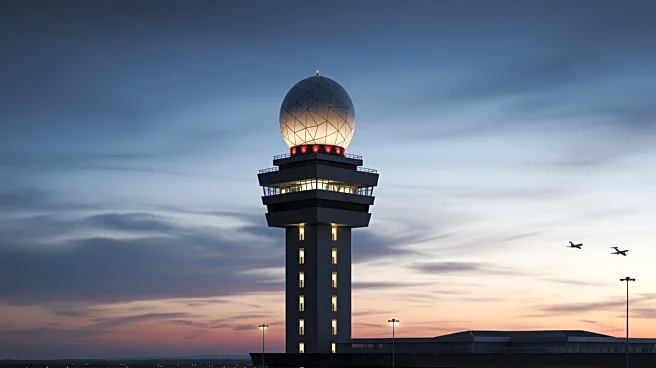What's Happening?
Air traffic at Keflavík International Airport returned to normal after the Icelandic Air Traffic Controllers Association (FÍFÍ) concluded a brief overnight strike. The strike began at 10 pm on Sunday and ended
at 3 am on Monday, grounding nearly all flights during this period. Only one aircraft was allowed to operate while the strike was in effect. Keflavík Airport is crucial for international flights to and from Iceland, and even short work stoppages can lead to significant travel disruptions. The strike was part of ongoing negotiations between the controllers' union, the Confederation of Icelandic Employers, and Isavia ANS, which manages Iceland's air navigation services. The dispute centers on salary demands from the air traffic controllers, who are seeking a substantial pay increase.
Why It's Important?
The strike highlights the critical role of air traffic controllers in maintaining the flow of international travel and the potential for significant disruptions when labor disputes arise. The situation underscores the importance of resolving salary negotiations to prevent further disruptions, which could impact Iceland's tourism industry and international travel connections. The planned second work stoppage on Tuesday night could further affect offshore flight operations, emphasizing the urgency for a resolution. The ongoing dispute and potential for additional strikes could have broader implications for labor relations and negotiations in Iceland's aviation sector.
What's Next?
Negotiations between the air traffic controllers' union and Isavia ANS are expected to resume soon, with a state mediator involved in facilitating discussions. The union has planned a second work stoppage for Tuesday night, which could affect offshore flight operations. If no settlement is reached, further actions may follow, potentially leading to more travel disruptions. Stakeholders, including travelers and the tourism industry, will be closely monitoring the situation, hoping for a swift resolution to avoid prolonged impacts on travel and tourism.
Beyond the Headlines
The strike and ongoing negotiations may prompt discussions about labor rights and compensation in Iceland's aviation industry. It could lead to broader considerations of how labor disputes are managed and resolved in essential services, potentially influencing future labor policies and practices. The situation also raises questions about the balance between fair compensation for workers and maintaining uninterrupted service in critical sectors.









